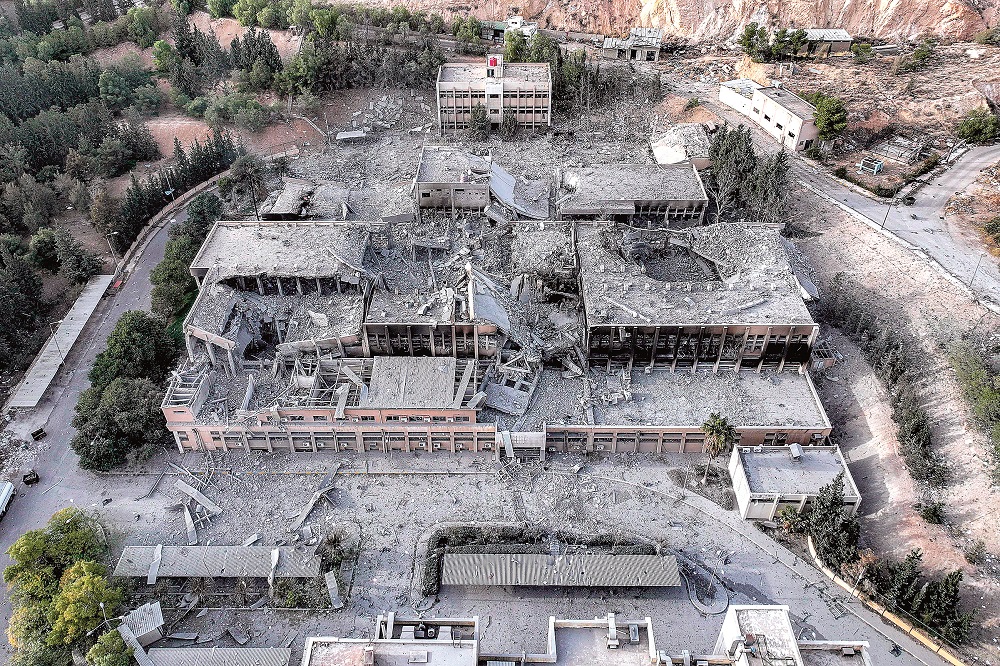Israeli strikes on Syria decried
Domestic upheaval must not be exploited to undermine sovereignty, UN warns
By Jan Yumul in Hong Kong | China Daily | Updated: 2024-12-12 10:02

The United Nations said on Tuesday that it rejects any aggression against Syrian sovereignty and violations of its territorial integrity, while Israel said it was establishing a "sterile defense zone" in southern Syria after carrying out more than 350 strikes in 48 hours.
Stephane Dujarric, spokesman for UN Secretary-General Antonio Guterres, said at a news conference that Syria's "turning point" should not be used by its neighbors to encroach upon its territory, and should instead be used by all those in the region to support the Syrian people.
Dujarric said they were very clear about the violation of the 1974 disengagement agreement following the Israel Defense Forces' occupation of the buffer zone. In 1967, Israel occupied most of the Golan Heights during the Middle East war and later annexed the territory. This was never recognized by the international community.
Meanwhile, Geir Pedersen, the UN special envoy for Syria, told journalists in Geneva on Tuesday that the conflict in northeastern Syria is not over as there have been clashes between the Syrian National Army, the opposition groups and the Syrian Democratic Forces.
"We are calling obviously for calm also in this area," Pedersen said.
In addition, Israeli troop movements into the occupied Golan Heights and bombardments "need to stop", he said. "The message from New York is just the same — that what we are seeing is a violation of the disengagement agreement in 1974."
In a post on X, the Israel Defense Forces reported striking most of what it claimed were the strategic weapons stockpiles in Syria in 48 hours "to prevent them from falling into the hands of terrorist elements".
Among the actions were more than 350 airstrikes. A "wide range of targets" included antiaircraft batteries, Syrian Air Force airfields and dozens of alleged weapons production sites in Damascus, Homs, Tartus, Latakia and Palmyra.
Syria's naval operations were also targeted, including the Al-Bayda port and the Latakia port, where 15 Syrian naval vessels were hit.
Pedersen said Syria is still in a very "fluid" period, adding that there is a real opportunity for change, but it needs to be grasped by the Syrians themselves and supported by the UN and the international community.
Abu Mohammad Al-Jolani, leader of the opposition group Hayat Tahrir al-Sham that led the rebel offensive and wrested control of Syria, told CNN that their goal had been to overthrow Syria's longtime president Bashar al-Assad.
Syria's caretaker Prime Minister Mohamed al-Bashir called for stability and calm amid a leadership change.
On Wednesday, Iran's Supreme Leader Ayatollah Ali Khamenei said the toppling of Assad was the result of a plan by the United States and Israel.
"What happened in Syria was mainly planned in the command rooms of America and Israel. We have evidence of this. A neighboring government of Syria was also involved," Khamenei said in a speech reported by state media, without naming the neighboring country in question.
Dina Yulianti Sulaeman, director of the Indonesia Center for Middle East Studies, told China Daily that Israel, which is "most invested in weakening Syria" because of the latter's historically hostile stance toward it, will not allow Syria to become stable and secure.
"In recent days, Israel has bombarded Syria, destroying nearly all of Syria's military facilities, effectively leaving the country with no capacity to defend its sovereignty," she said.
"The accumulation of Israeli attacks, the collapse of infrastructure safeguarding territorial sovereignty, economic hardships, and internal chaos bring the potential for Syria's balkanization, as long envisioned in Israel's Oded Yinon Plan."
The Oded Yinon Plan refers to a strategy, outlined in a 1982 article by a former Israeli official and scholar, for Israel's expansion in the Middle East and North Africa region.
Reuters contributed to this story.
























